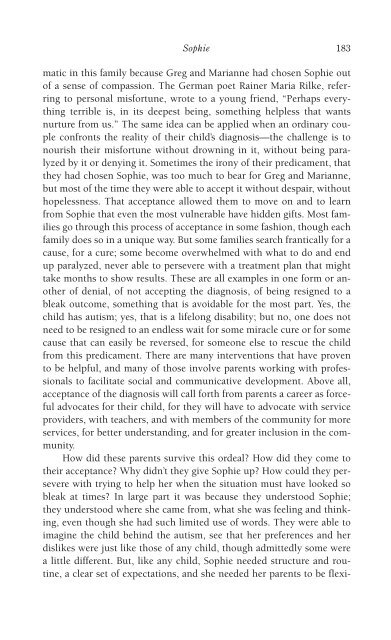978-1572305441
autism
autism
You also want an ePaper? Increase the reach of your titles
YUMPU automatically turns print PDFs into web optimized ePapers that Google loves.
Sophie 183<br />
matic in this family because Greg and Marianne had chosen Sophie out<br />
of a sense of compassion. The German poet Rainer Maria Rilke, referring<br />
to personal misfortune, wrote to a young friend, “Perhaps everything<br />
terrible is, in its deepest being, something helpless that wants<br />
nurture from us.” The same idea can be applied when an ordinary couple<br />
confronts the reality of their child’s diagnosis—the challenge is to<br />
nourish their misfortune without drowning in it, without being paralyzed<br />
by it or denying it. Sometimes the irony of their predicament, that<br />
they had chosen Sophie, was too much to bear for Greg and Marianne,<br />
but most of the time they were able to accept it without despair, without<br />
hopelessness. That acceptance allowed them to move on and to learn<br />
from Sophie that even the most vulnerable have hidden gifts. Most families<br />
go through this process of acceptance in some fashion, though each<br />
family does so in a unique way. But some families search frantically for a<br />
cause, for a cure; some become overwhelmed with what to do and end<br />
up paralyzed, never able to persevere with a treatment plan that might<br />
take months to show results. These are all examples in one form or another<br />
of denial, of not accepting the diagnosis, of being resigned to a<br />
bleak outcome, something that is avoidable for the most part. Yes, the<br />
child has autism; yes, that is a lifelong disability; but no, one does not<br />
need to be resigned to an endless wait for some miracle cure or for some<br />
cause that can easily be reversed, for someone else to rescue the child<br />
from this predicament. There are many interventions that have proven<br />
to be helpful, and many of those involve parents working with professionals<br />
to facilitate social and communicative development. Above all,<br />
acceptance of the diagnosis will call forth from parents a career as forceful<br />
advocates for their child, for they will have to advocate with service<br />
providers, with teachers, and with members of the community for more<br />
services, for better understanding, and for greater inclusion in the community.<br />
How did these parents survive this ordeal? How did they come to<br />
their acceptance? Why didn’t they give Sophie up? How could they persevere<br />
with trying to help her when the situation must have looked so<br />
bleak at times? In large part it was because they understood Sophie;<br />
they understood where she came from, what she was feeling and thinking,<br />
even though she had such limited use of words. They were able to<br />
imagine the child behind the autism, see that her preferences and her<br />
dislikes were just like those of any child, though admittedly some were<br />
a little different. But, like any child, Sophie needed structure and routine,<br />
a clear set of expectations, and she needed her parents to be flexi-



